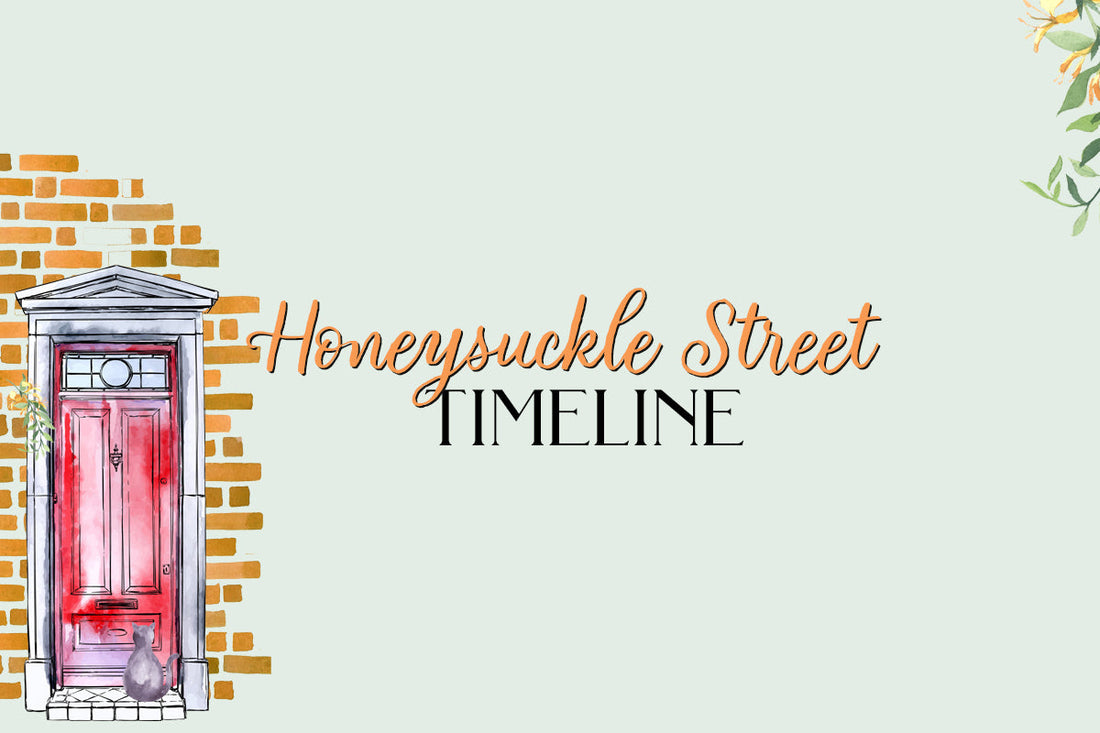Which was the first house to be built on Honeysuckle Street? Who arrived when? And why is it called Honeysuckle Street? All these answers and more can be found in the timeline of construction and changes on our favourite street in London.



A villa, built in the Italian Palladian style, is erected by Lord Straithwaite, 7th Marquis of Henley, on open land in a village on the outskirts of London.

Part of the landholding is subdivided and gifted to the 6th Duke of Osborne by the 9th Marquis of Henley in lieu of paying substantial gambling debts.

Duke Osborne builds a sandstone townhouse as his London residence when Parliament is sitting. He also orders the construction of 2 workers cottages, and a driveway from the main thoroughfare to the front of the house.

Duke Osborne subdivides part of the property to cover substantial gambling debts. Three houses are built and leased out. But while the houses are brick, they are constructed by low quality builders. After extensive (and expensive) negotiations with the 10th Marquis of Henley, the driveway is formalised and straightened to becomes a street.
It is named Honeysuckle Street after the favourite flower of the dukes mistress.

The 11th Marquis of Henley donates a portion of the grounds for the erection of a church and for greenspace.

Public subscription raises funds to dig a pond in the garden and install a fountain to commemorate English victory at Waterloo over Napoleon. Dedicated to the Marquis's only son who died there. Line become extinct. Palladian villa stands vacant.

Seventh Duke Osborne dies. Houses on south side sold to cover debts.
Earl Caplin purchases house that family had been leasing. Knocks down and rebuilds.

Middle house purchased by eccentric old lady who loves cats.

Albert Abberton purchases last remaining house. Demolishes and builds a red brick four story (basement, ground floor, first floor, attic) home.

Arley, heir to the Duke of Osborne, born, arriving unexpectedly early at the London townhouse. Against the odds of being premature, he survives.
Albert Abberton adopts orphan Iris.
Hamish, second son of Earl Caplin, born.
Pious widow Mrs Crofts leases workers cottage on the north side of Honeysuckle Street.
Seventh Duke of Osborne dies. Arley West becomes eighth duke

Events of I Will Steal You the Stars
Hempel family lease second old workers cottage on the north side of Honeysuckle Street
Metropolitan Management Act introduces standardised numbering and naming of streets in London. London divided into postal districts.

Following her stage debut, Odette Delaney is gifted the Italian Palladian by a German Archduke.
Litter of four kittens born in the kitchens at Number six. Are named Mittens, Georgiana, Jimmy and Spencer
Mysterious lady who lived at Number six dies.
Dalton Tragedy. Death of Lady Dalton and the heir apparent. Earl and his son leave for their country estate to mourn.

Duke Osborne (age 21) relocates to London.
Becomes patron of The Society for the Promotion of Civic Morality and the Adherence to Proper Values.

Land on northside of street sold to developers. Residents in the cottages given first option to buy new townhouses (as negotiated by Duke Osborne). Mrs Crofts purchases the central townhouse. Lawrence Hempel places a deposit on Number 1.

Workers cottages demolished. Construction on new townhouses begins. Townhouses are sold off the plan.
Phineas Babbage gazzumps Lawrence Hempel to purchase Number 1.

Townhouses sell quickly, and new owners move in.
Number 1: Phineas Babbage
Number 3: Hempel Family
Number 5: Mrs Crofts
Number 7: Petunia Hartright
Number 9: Benton Hunter

Events of A Song and a Snowflake